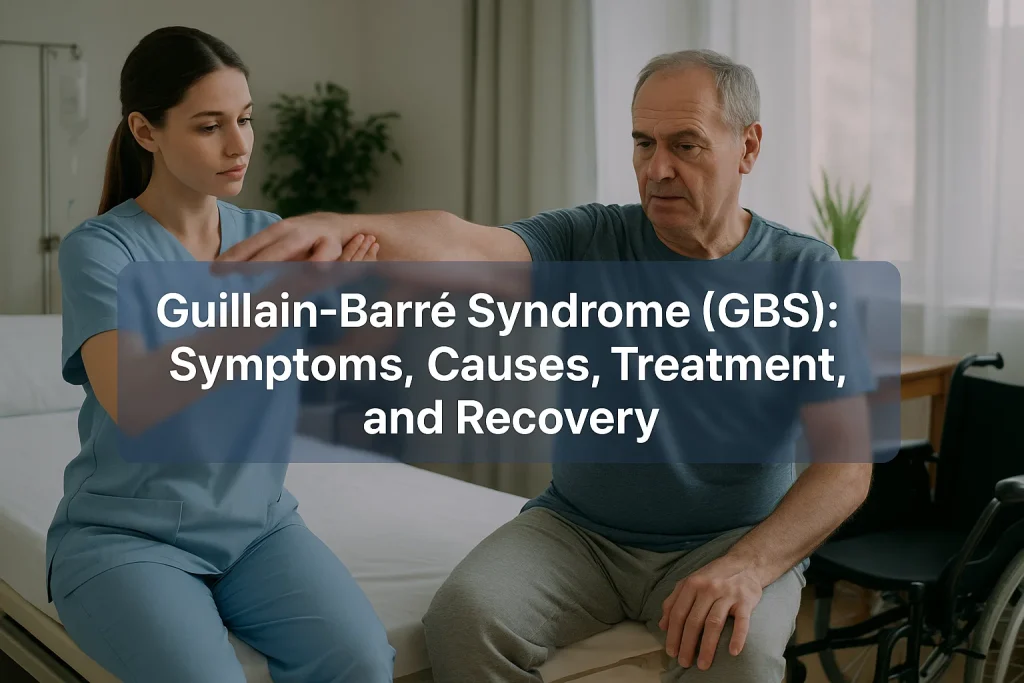
Guillain-Barré Syndrome (GBS): Symptoms, Causes, Treatment, and Recovery
Guillain-Barré Syndrome (GBS) outbreaks have been documented worldwide, often following viral or bacterial infections. Although the condition is rare, its sudden appearance and possible consequences make it a medical emergency. GBS is an autoimmune disorder where the body’s immune system mistakenly attacks the peripheral nervous system, causing weakness, tingling sensations, and sometimes life-threatening paralysis.
This article aims to provide a comprehensive understanding of the symptoms, causes, risk factors, treatment options, and recovery process of Guillain-Barré Syndrome, offering a guide to awareness and early detection.
Understanding Guillain-Barré Syndrome
Guillain-Barré syndrome is a rare neurological and autoimmune condition. It occurs when the immune system mistakenly attacks peripheral nerves, causing damage to the myelin sheath (the outer insulating layer). This causes tingling, numbness, and progressive weakness that usually begins in the legs and spreads upwards, a condition known as ascending paralysis.
What are the Types of Guillain-Barré Syndrome?
Depending upon their occurrence in different regions, it can be divided into:
- Acute Inflammatory Demyelinating Polyradiculoneuropathy (AIDP): Commonly found in North America and Europe. The early symptom is progressive muscle weakness, typically beginning in the lower limbs and slowly moving upward.
- AMAN (Acute Motor Axonal Neuropathy): causes axonal damage and is more common in Asia and Latin America.
- AMSAN (Acute Motor-Sensory Axonal Neuropathy): Severe, affecting both motor and sensory nerves.
- Miller Fisher syndrome (MFS): Commonly found in Asia and less common in the U.S. In this form, paralysis typically begins in the eye muscles; people often face difficulty while walking.
What are the symptoms of Guillain-Barré Syndrome?
Recognizing these conditions early can save lives; it usually progresses slowly over days to weeks, with weakness starting in the legs and feet as an early sign and often peaking by the 2nd and 3rd week.
As the disease progresses at every stage, the signs and symptoms of Guillain-Barré Syndrome include
1. Early Symptoms
- Tingling or pins and needles in the fingers and toes.
- Leg weakness, trouble climbing stairs, or stumbling.
- Loss of reflexes (e.g., knee jerk).
2. Progressive Symptoms
- Weakening of the muscle spreads to the arms and face.
- Difficulties speaking, chewing, or swallowing (dysphagia).
- Loss of balance and poor coordination.
- Sharp, shooting pain in the back or nerves.
3. Severe Symptoms (Emergency)
- Breathing difficulty (due to weak chest muscles).
- Inability to walk or move arms (due to peripheral nerve damage).
- Abnormal heartbeat or unstable blood pressure (sign of heavy nerve damage).
- Nerve dysfunction resulting in constipation or urine retention.
If weakness spreads quickly or if you feel sudden weakness in muscles, with breathing/swallowing becoming difficult, contact your doctor immediately, and get immediate hospitalization if symptoms worsen.
What are the causes of Guillain-Barré Syndrome?
The exact cause of GBS is still unknown; researchers have believed that it can be related to immune system activation after an infection. Some of the common triggers include
- Gastrointestinal infection: Campylobacter jejuni, a bacterium often linked to contaminated food or water, can trigger GB.
- Viral infections: People with GBS may be infected with the Zika virus, Epstein–Barr virus, or cytomegalovirus.
- Respiratory Infections: It includes Flu, pneumonia, or COVID-19.
- Vaccination: In extremely rare cases, vaccinations may be associated with GBS, though the risk is significantly lower than that posed by infection-related triggers.
- Surgery: Extremely rare, but GBS may appear in some people after surgery.
Note: If you have any of the above infections and have symptoms related to GBS, call a doctor and seek help immediately.
How can Guillain-Barré Syndrome appear after an infection?
GBS can appear post-infection. When your immune system is active and releases antibodies to fight disease, it can mistakenly attack nerve cells, causing this condition. The underlying mechanism involved is known as molecular mimicry.
How is Guillain-Barré Syndrome (GBS) diagnosed?
Diagnosing GBS can be challenging in its early stages. A doctor will usually perform a physical and neurological examination and review your medical history before ordering tests to confirm the diagnosis and rule out other conditions. If detected, a proper treatment plan is followed for quick recovery.
- Nerve Conduction Studies
If the symptoms resemble neurological conditions other than GBS, the doctor may use these tests to diagnose the condition.
Electromyography: This test checks for your muscle health by inserting small, thin needle electrodes to check for abnormal electrical activity, indicating nerve or axonal damage
Nerve conduction test: It is used to check for nerve conduction and electrical signals in your muscles by tapping electrodes into your skin. Any abnormal signal typically indicates nerve damage that may be related to GBS.
- Spinal Tap (Lumbar Puncture)
In this procedure, a needle is inserted into your lower back to collect the cerebrospinal fluid. These were then sent to the lab for further analysis.
CSF analysis often reveals a high protein level in conjunction with a normal or low white blood cell count. This characteristic finding, known as albuminocytologic dissociation, is a hallmark of GBS in approximately 75-80% of cases.
- Imaging test
Magnetic resonance imaging (MRI) of the whole spine or lumbar spine may be done to rule out other symptoms causing nerve compression, pain, or inflammation.
What are the Treatment options for Guillain-Barré Syndrome?
While there is no permanent treatment for Guillain-Barré Syndrome, some specialized treatment and preventive therapies can reduce the severity and symptoms for a speedy recovery.
- Intravenous Immunoglobulin (IVIG): A good dose of Immunoglobulin that contains healthy antibodies is collected from the donor and injected intravenously to regulate the immune system and block the harmful antibodies from attacking nerves, thus helping reduce the effects of GBS.
- Plasma Exchange (Plasmapheresis): In this procedure, the machine filters out harmful antibodies from plasma, and then the plasma and blood are returned to your body.
These two are the most effective treatments that can help reduce recovery time.
Health Complications of GBS
Guillain-Barré Syndrome (GBS) is a rare but serious condition that affects the nerves. Since nerves control both movement and body functions, GBS can lead to a wide range of health problems. Some of the most common complications include
- Breathing difficulties: Breathing becomes difficult when the respiratory muscles become paralyzed or weak. In some cases, this can be fatal. Some studies show that ~22% of people with Guillain-Barré Syndrome require temporary ventilator support during their first week in the hospital.
- Residual numbness or tingling: While most people recover completely, some may experience weakness, numbness, or tingling long after treatment.
- Heart and blood pressure issues: Irregular heart rhythms and fluctuations in blood pressure are frequent complications of GBS.
- Blood clots: Limited mobility raises the risk of deep vein thrombosis. Patients may be advised to take blood thinners or wear compression stockings until they regain mobility.
- Bedsores: The inability to shift positions frequently can result in pressure ulcers. Regular repositioning and good skin care can help prevent them.
- Relapse: Although rare, a small percentage of patients may experience a relapse, with muscle weakness returning years after treatment.
- Chronic Nerve pain: Reported in around one-third of patients, which can often be managed with medications.
- Bladder and bowel problems: Slowed bowel movements and difficulty emptying the bladder are possible symptoms of Guillain-Barré Syndrome.
Supportive care for GBS
- Respiratory support, including mechanical ventilation as needed.
- Monitor blood pressure and heart rate if GBS symptoms worsen.
- Pain relief with neuropathic medications for a speedy recovery.
- Physical therapy can help prevent stiffness and maintain muscle strength.
- Nutritional support, sometimes requiring the use of feeding tubes, is used to regain strength quickly.
How to recover from Guillain-Barré Syndrome (GBS)?
Recovery times vary depending on the severity and type of GBS.
Stages of GBS
- Progression Phase (up to 4 weeks): Symptoms worsen until they reach their peak.
- Plateau Phase (lasts from days to weeks): Symptoms stabilize but do not improve.
- Recovery Phase: Strength gradually returns as nerves start to heal (weeks to months).
Long-term benefits
- Patients typically recover in six to twelve months.
- About 70–80% can walk on their own again.
- About 15% may feel tired or weak for a long time.
- The low death rate (~3–5%) is usually due to respiratory issues.
Rehabilitation
This will help you to recover effectively from the GBS by managing pain and stiffness caused by nerve damage. Some of the best therapies to regain strength for quick recovery include:
- Physical therapy: Improves the way your body moves. A physical therapist helps you manage pain, stiffness, and discomfort while also teaching you exercises to regain muscle strength.
- Occupational therapy: Aims to improve your ability to perform everyday tasks. An occupational therapist will teach you how to sit, stand, move, and use tools or equipment safely so that you can continue to function independently in your daily life.
- Speech therapy: If your mouth or throat muscles are affected by Guillain-Barré Syndrome (GBS), a speech-language pathologist can help you regain your ability to speak and swallow.
- Mobility devices: Canes, braces, walkers, and wheelchairs promote safe movement, reduce fatigue, and help prevent falls.
How to prevent Guillain-Barré Syndrome (GBS)
- Practicing safe and good hygiene, like handwashing and food handling
- Drinking safe, pure water.
- Avoiding undercooked meat and contaminated food.
- Timely vaccination against common infections (discuss risks/benefits with your doctor).
- Boost your immunity with a healthy lifestyle.
Conclusion
Guillain-Barré Syndrome is a serious but treatable neurological condition that requires immediate medical attention. Outbreaks are common after infections, and being aware of early symptoms, such as tingling, weakness, or difficulty walking, can help ensure timely treatment. Most patients recover well after receiving therapies such as IVIG or plasmapheresis, as well as comprehensive rehabilitation.
To reduce risks during a GBS outbreak, stay informed, practice preventive hygiene, and seek early medical attention.
FAQs
Who is most likely to get Guillain-Barré Syndrome?
Guillain-Barré Syndrome (GBS) can affect people of all ages. However, it is most common in adults aged 30 to 50 years old. GBS can affect both men and women, but some studies suggest it is slightly more common in men.
How common is Guillain-Barré Syndrome?
Guillain-Barré Syndrome is a rare neurological disorder. Every year, approximately 100,000 people worldwide are diagnosed with GBS. This means that the condition affects approximately one out of every 78,000 people each year.
What causes Guillain-Barré Syndrome?
It usually occurs after an infection such as food poisoning (Campylobacter), the flu, or the Zika virus. The immune system mistakenly targets nerves.
How quickly does GBS progress?
Symptoms can appear within days and typically peak by the second or third week.
Is Guillain-Barré Syndrome infectious?
No, GBS is not contagious. However, the infections that cause it may spread throughout communities.
Is GBS curable?
There is no permanent cure, but treatments such as IVIG and plasma exchange can hasten recovery and reduce severity.
What is the recovery rate for GBS?
Most patients recover completely within 6-12 months, though some may experience persistent weakness or fatigue.
Can GBS come back?
Recurrence is rare but possible in a small percentage of patients.
- PCOS (Polycystic Ovary Syndrome): Causes, Symptoms, Diagnosis, and Treatment
- COPD (Chronic Obstructive Pulmonary Disease): Symptoms, Causes, Diagnosis & Treatment Guide





